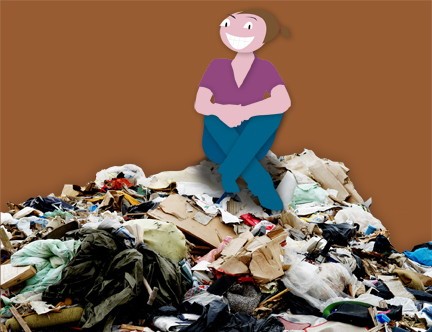Happy Canadians leave large eco-footprint
The cost of overpaying for our well-being
We Canadians are a jovial bunch. But we may be overpaying for our sense of self-worth.
The Happy Planet Index study published by the New Economics Foundation measures the well-being of countries across the globe against their ecological footprint. The results show that although we have always equated greater wealth – and hence, exploitation – with greater happiness, this may be false.
Canada ranked 89 out of 143 countries, meaning we have a high sense of well-being and a fat footprint to match. Costa Rica, which has significantly lower income levels than us, came in first.
These findings suggest that while a certain level of national wealth contributes to happiness, excessive wealth does not correlate to greater well-being.
“Our patterns of consumption are not sustainable,” said Randall McQuaker, executive director of Resource Conservation Manitoba.
“If other nations consumed and destroyed at the same rate that we do, the planet could not sustain it.”
However, the study suggests adopting more sustainable practices will not lead to a lesser quality of life.
“There is a reasonable link between resource consumption and basic well-being,” said McQuaker. “But if we consume more are we necessarily more well off? To a degree that may be true. However, there is a point at which more material consumption doesn’t equate to more happiness. Excessive consumption doesn’t make you happier.”
Case in point: Costa Rica. How they came out on top with high well-being and a relatively tiny footprint may in part be related to what happiness means to them.
“In North American cultures, wealth is seen as a better indicator of satisfaction, whereas in Eastern cultures, it is family connection and social relationships which are emphasized,” said Marian Morry, a social psychologist at the University of Manitoba.
Exactly how North America can manage a shift in social values and reduce our ecological footprint while weathering current economic hardships remains to be seen.
“If you look at how the crisis in the auto industry was dealt with, the solution the government came up with was to produce more cars,” said McQuaker. “That is not the most sustainable solution. We require transport of course, but we need to look at other ways to get around.”
But the average person need not feel completely helpless. McQuaker emphasized that social change takes time and advocated practical solutions that can be implemented in everyday contexts.
Local composter Margaret Munn embodies this approach.
“We compost all of our vegetables and fruit, which cut down on our waste. Then we use the compost in our vegetable garden. The vegetable waste from the food we eat then goes to make more compost. It’s a cyclical (approach). It cuts down on our rubbish and it provides us with food.”
Published in Volume 64, Number 1 of The Uniter (September 3, 2009)







